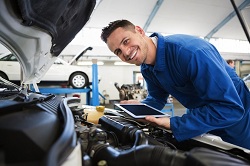Is it time to buy your “teen” their first car? Be ready for significant expenses beyond the purchase price: You’re also on the hook for, fuel, maintenance, repairs, insurance, and taxes… Here’s a few tips!
Establish your budget?
Establishing a reasonable budget is critical. The money you have available for a down payment and potential for making monthly installments on a loan will determine your car choices.
Is this is a car just through high school or whether it will be their traveling companion through college. That distinction will determine how new and reliable the car must be.
No question, the best way to save money is to buy used. By purchasing used, you can buy more car, meaning you could afford, say, a midsized sedan rather than a tiny econobox. A new car loses almost half its value in the first five years, on average but has more than half its useful life left. Letting someone else take the depreciation hit is a smart bet. But try to buy the newest car you can, in order to get the most up-to-date safety features. And
Do your homework
With a budget in mind, now comes the fun part: creating a short list of target vehicles. Focus on practical choices—cars that will minimize ownership costs and suit your needs for the next few years.
To right-size your costs, resist the temptation to target sporty, luxury, or large vehicles. They can be costly to maintain and insure, and tend not to get good fuel mileage. Look to small sedans and hatchbacks from mainstream brands, or even better, midsized sedans. The insurance company will penalize a young driver in a sporty car; big engines cost more to fuel and maintain; and gee-whiz features tend to carry reliability risks. Plus, financed new cars will command higher insurance premiums to cover collision protection. Simple is best.
To reduce the risk of purchasing a trouble-prone vehicle, identify models with a good reliability record before you begin shopping. Consumer Reports collects data on more than a million cars a year to present reliability information covering the past decade. Such data can point you to cars that have been shown to hold up well over time. Reliability is a key factor, as it speaks to potential costs and inconvenience.
Read online reviews of the cars you’re considering from both automobile publications and owner forums. Balance the different perspectives against your preferences, and use the feedback to highlight aspects that warrant closer attention. For instance, complaints about the seat comfort or ride quality can be evaluated on a test drive. Your opinions may differ from those held by others. And ultimately, it is you who will live with the car.
Inspect and test-drive
With a used car, every example has led a different life. Some may have been pampered, others abused, potentially by a teenager just like yours! The best used cars tend to be owned by a trusted friend or family member who can share details of the car’s history. When shopping used, carefully look the car over inside and out, top to bottom. Always inspect during daylight hours when paint flaws that may indicate repairs or other troubles can be readily spotted. Essentially, you’re looking to ensure the car is in the condition claimed by the seller. For used cars, the real trick is having the car inspected by a professional mechanic. They will usually charge for the service, but it can be money very well spent.
Here are some used cars that rate high on the list for teens owning their first vehicle:
- Ford Focus 2009-2011
- Ford Fusion 2010-2012
- Chevrolet Malibu 2009-2012
- Hyundai Sonata 2006-2014
- Toyota RAV4 2004-2012
Need help? Feel free to call me, we’ll get them driving!
(757) 560-4252 Ask for Mike
Posted 03/25/2016 in TM AUTO UPDATE




